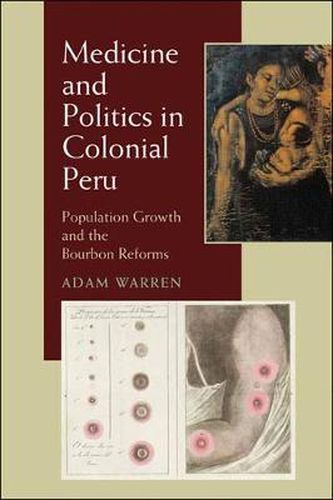Readings Newsletter
Become a Readings Member to make your shopping experience even easier.
Sign in or sign up for free!
You’re not far away from qualifying for FREE standard shipping within Australia
You’ve qualified for FREE standard shipping within Australia
The cart is loading…






By the end of the eighteenth century, Peru had witnessed the decline of its once-thriving silver industry and had barely begun to recover from massive population losses due to smallpox and other diseases. At the time, it was widely believed that economic salvation was contingent upon increasing the labor force and maintaining as many healthy workers as possible. In Medicine and Politics in Colonial Peru, Adam Warren presents a groundbreaking study of the primacy placed on medical care to generate population growth during this era.
The Bourbon reforms of the eighteenth century shaped many of the political, economic, and social interests of Spain and its colonies. In Peru, local elites saw the reforms as an opportunity to positively transform society and its conceptions of medicine and medical institutions in the name of the Crown. Creole physicians, in particular, took advantage of Bourbon reforms to wrest control of medical treatment away from the Catholic Church, establish their own medical expertise, and create a new, secular medical culture. They asserted their new influence by treating smallpox and leprosy, by reforming medical education, and by introducing hygienic routines into local funeral rites, among other practices.
Later, during the early years of independence, government officials began to usurp the power of physicians and shifted control of medical care back to the church. Creole doctors, without the support of the empire, lost much of their influence, and medical reforms ground to a halt. As Warren’s study reveals, despite falling in and out of political favor, Bourbon reforms and creole physicians were instrumental to the founding of modern medicine in Peru, and their influence can still be felt today.
$9.00 standard shipping within Australia
FREE standard shipping within Australia for orders over $100.00
Express & International shipping calculated at checkout
By the end of the eighteenth century, Peru had witnessed the decline of its once-thriving silver industry and had barely begun to recover from massive population losses due to smallpox and other diseases. At the time, it was widely believed that economic salvation was contingent upon increasing the labor force and maintaining as many healthy workers as possible. In Medicine and Politics in Colonial Peru, Adam Warren presents a groundbreaking study of the primacy placed on medical care to generate population growth during this era.
The Bourbon reforms of the eighteenth century shaped many of the political, economic, and social interests of Spain and its colonies. In Peru, local elites saw the reforms as an opportunity to positively transform society and its conceptions of medicine and medical institutions in the name of the Crown. Creole physicians, in particular, took advantage of Bourbon reforms to wrest control of medical treatment away from the Catholic Church, establish their own medical expertise, and create a new, secular medical culture. They asserted their new influence by treating smallpox and leprosy, by reforming medical education, and by introducing hygienic routines into local funeral rites, among other practices.
Later, during the early years of independence, government officials began to usurp the power of physicians and shifted control of medical care back to the church. Creole doctors, without the support of the empire, lost much of their influence, and medical reforms ground to a halt. As Warren’s study reveals, despite falling in and out of political favor, Bourbon reforms and creole physicians were instrumental to the founding of modern medicine in Peru, and their influence can still be felt today.